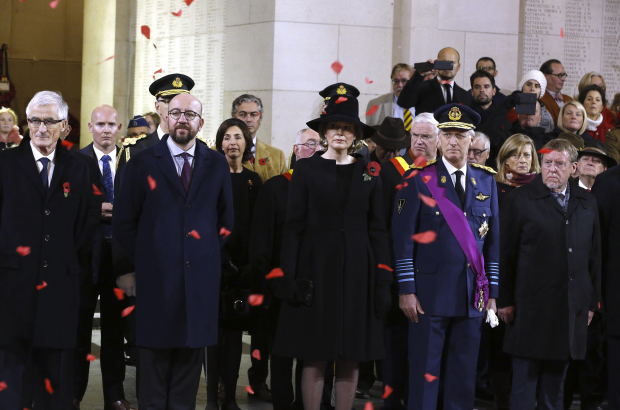- Daily & Weekly newsletters
- Buy & download The Bulletin
- Comment on our articles
Thousands attend Armistice memorial events around Belgium
King Philippe of Belgium has issued a plea to young people to keep the memory of the First World War alive and "engage together in building a world of peace".
The king delivered a speech and led a minute's silence on Sunday during a memorial service at Brussels' Congress column to mark 100 years since the war's end.
"The day will come when we will no longer be able to count upon the presence of veterans who have defended our territory," King Philippe said. "I pledge to keep alive, with you, the memory of those who sacrificed themselves for us and the values for which they fought."
A dove, symbol of peace, and 11 pigeons - which were widely used as a means of communication during the war - were released in the air during the ceremony, while children gave recitals.
It was a double commemoration with a Canadian flavour for the city of Mons, marking the 100th anniversary of the armistice and the end of the city’s occupation. Canada’s oldest Scottish regiment, The Black Watch, marched through the Grand Place to the sound of bagpipes at 11.00.
In a 12-hour programme of events, an afternoon highlight was a liberation parade in which Canadian, Belgian, French and British troops were joined by veterans and a delegation from the nearby Shape base. The commemorative ceremony included wartime tanks and vehicles as well as musicians and actors in period costume.
Prince Laurent of Belgium, Wallonia Minister-President Willy Borsus and Mons mayor Elio Di Rupo were joined by ambassadors from France, New Zealand and Ireland and a crowd of thousands.
During the last week of World War One, Canadian troops helped free the French-Belgian region near Mons. On 11 November 1918, they liberated the city from German occupation.
Two minutes before the ceasefire, Private George Lawrence Price was killed by a German sniper close to Mons. He was the last Canadian and Commonwealth soldier to die in the war. Buried in Saint-Symphorien Military Cemetery, alongside the first soldier in the war to die John Parr and German soldiers, his death is seen as a symbol of the futility of the four-year conflict that killed millions.
In Flanders, the biggest events of the day were of course in the Westhoek, home to much of the Western Front. VRT broadcast live from the Markt in Ypres for about 10 hours, with local events interspersed with war-related reports and archival footage. Some 10,000 visitors from Belgium and abroad were in the city, together with local residents.
A Last Post was performed at 11.00 under the Menin Gate, attended by hundreds of Flemish politicians, locals and tourists. “It was very powerful,” minister-president Geert Bourgeois told VRT. “One hundred years later, the suffering is being memorialised. This commemoration was carried out with so much serenity. People are here because they never want to forget. It remains so meaningful.”
The day continued with concerts, a special exhibition in Astrid Park, the Poppy Parade and a memorial at the city’s War Victims Monument. Finally, the regular nightly Last Post was performed, which included a rendition of David Bowie’s “Heroes” by Flemish musician Ozark Henry. The event closed out three days of activities in the city.
In Tervuren, just outside Brussels, the open-air art installation “Maaiveld” was brought to a close with a weekend of evening activities, including light and sound effects and fire performances.
In Leuven, a carillon rang out at 11.00 in the city's Park Abbey for the first time in 100 years. One of the most famous acts of destruction early in the war was the ravage of Leuven, when Germans destroyed the university library and murdered more than 200 civilians. They also destroyed the tower containing the carillon in Park Abbey.
Two years ago, a project to replace the carillon was started by the city of Leuven in partnership with the city of Neuss in Germany. The project began when a city archivist in Neuss discovered that it was troops from his city that were largely responsible for the devastation in Leuven. The carillon is part of the War Memorial and Peace Carillons project, a network of carillons created or reconstructed over the last century.
Belgian prime minister Charles Michel spent part of Armistice Day in Paris with a number of other world leaders, including German chancellor Angela Merkel, for commemorations hosted by French president Emmanuel Macron.
“It is symbolically extremely important that, 100 years later, we learn the lessons of the past,” said Michel. “I am counting on a strong European engagement in more multilateralism.”
Michel traveled back to Belgium to attend the Last Post ceremony in Ypres on Sunday evening.
Photo: Nicolas Maeterlinck/Belga



















Comments
WWI was completely unnecessary, it was essentially a European civil war that should have never happened
My father lost a brother and a sister to the war...the returning American troops brought influenza with them, that's what killed them, scarred my family for three generations, for what ?